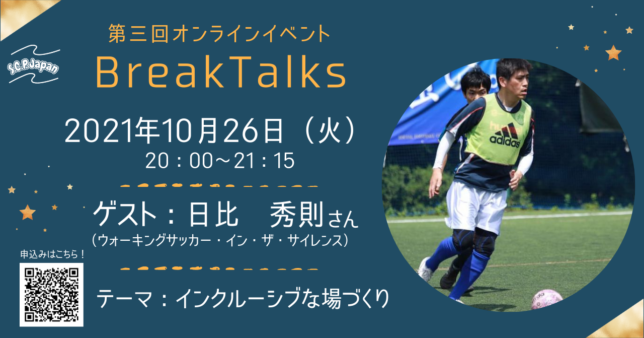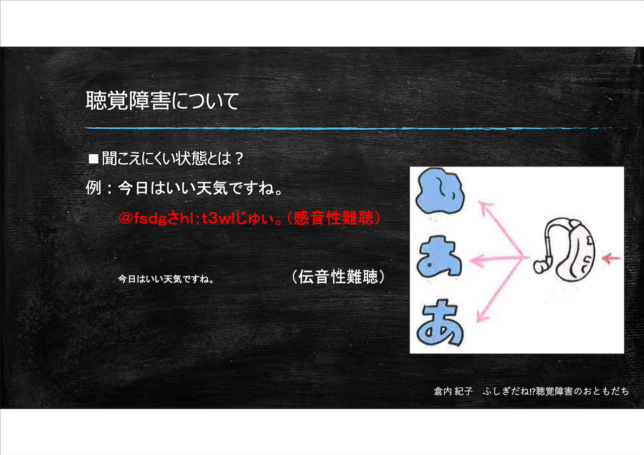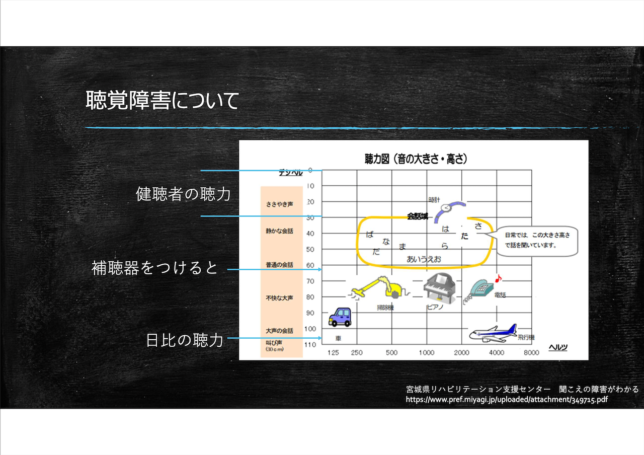On October 26th (Tuesday), S.C.P. Japan hosted its 3rd Break Talks with the theme of “Creating an inclusive place.” We invited Mr. Hidenori Hibi as a guest speaker, who is the founder of the voluntary organization, “Walking Soccer in the Silence” and is also a person with hearing impairment. He talked about hearing impairment, deaf soccer, and walking soccer. Furthermore, based on Mr. Hibi’s story, participants actively exchanged opinions regarding “what is inclusive?” and “how to create an inclusive place.”

At the beginning of the event Mr. Hibi explained, “Let’s take a reaction such as nodding while listening,” not only because he has a hearing impairment, but also because the speaker felt a little lonely without the reaction of the participants. It was also shared that the organizer would use a system called UDTalk to display and share subtitles on Zoom. Sign languages were also provided by volunteers.
What is hearing impairment?
In the first half of the guest talk, Mr. Hibi introduced what is hearing impairment using not only words but also illustrations.
Hearing-impaired people are those who are deaf or hard to hear. Mr. Hibi himself has congenital sensorineural deafness with a hearing loss of 105 dB (decibels). The speaker explained what is hearing impairment in layman’s terms so that participants could grasp its meaning and understand his own condition.


Mr. Hibi spent his childhood growing up in an environment where special needs classes were nonexistent. When he entered school, he was given the front row middle seat in class as a way of support from his school to adapt to his needs. However, he could not understand what the teachers were saying during most of his classes. Mr. Hibi was also exempted from doing presentations, which he felt lucky at that time. As he entered the real world he realized, “I had no experience of success or failure in speaking in public, and for the first time I experienced speaking in public at workplace, I found it difficult.” Mr. Hibi expressed his honest feelings to the participants, “I’m still very nervous as a guest of this online event.”
Regarding vocalization, he attended a “language class” from the first grade to the sixth grade of elementary school and learned how to vocalize from a speech therapist teacher. Even so, for example, when he says “jidosha” (car) and it does not get through to people well, he paraphrases it to “kuruma” (car).
Throughout his elementary, junior high and high school years, Mr. Hibi did not have the opportunity to learn sign language. In college, his chance encounter with a person with the same disability opened his doors to begin learning the sign language.
Deaf soccer
Deaf soccer, also known as “soundless soccer,” has very little sound during a match compared to other soccer matches. That is why Mr. Hibi emphasizes that one of the attractions of deaf soccer is that “referee judgment and players’ communication are based only on visible information.” For example, the defense line silently aligns the lines and sets an offside trap without talking to each other.
“Walking Soccer in the Silence” Activities
Mr. Hibi has been involved in soccer for many years and attended the Sports Managers College (SMC) satellite of the Japan Football Association in 2019. Soon after he planned an activity called “Walking Soccer in the Silence” and established this as a voluntary organization in January 2020. In Tokyo and Yokohama, he carries out walking soccer activities about once a month and online activities called “shuwaberi” every month.
【Walking Soccer in the Silence WEB site】https://wsits2020.com/
Walking soccer (walking football) is a sport that can be played regardless of gender or age, without worrying about the skill differences among beginners and experienced players. In the last 3 to 4 years, it has been attracting attention as an inclusive sport in Japan. (Japan Walking Football Federation https://jwfl.amebaownd.com/)
Mr. Hibi decided to use walking soccer to create opportunities for each person to think about “communication that suits each individual” and take active communication spontaneously while having fun.
The “Walking Soccer in the Silence” activity in Tokyo has different rules of the match from other walking soccer activities. In the 1st and 2nd games, it is prohibited to make sounds and voices; however, in the final 3rd game, players are allowed to make sounds and voices. After experiencing the 1st game and 2nd game, in the 3rd game, each person will take the initiative to think, act (play) and communicate in multiple ways so that the players with hearing impairment will not be isolated.
What is the communication that suits each person? “How can people who can’t hear, who can hear, and who are not good at speaking, communicate with each other?” These can be experienced through walking soccer in the silence. In addition, in activities in Yokohama, Mr. Hibi is also developing “inclusive walking soccer,” which will be played by a mixture of people with and without disabilities and ages.
What is an inclusive place?
After receiving the guest talk in the first half of the program, the second half was the time for participants to actively exchange opinions about “what is inclusive?” and “how can we create an inclusive place?”
Regarding the idea of providing an inclusive place, participants raised the issue of building a place where anyone can easily participate by expressing, “anyone is welcome.”
In addition, participants from various positions were able to give their opinions. One participant said that it is important to have a safe environment where people in need can ask for help.
Mr. Hibi also shared issues that happened during the activities. For instance, the participating children with disabilities seemed to have fun just because they were there, but the people around them sometimes tried to take care of the children too much.
Finally, Mr. Hibi said, “I find the word “inclusive” is not familiar for us. I think inclusive can be explained using another familiar word for us as “otagaisama” (it’s give-and-take).”
The 3rd BreakTalks ended with active participation.
Through these Break Talks, S.C.P.Japan will continue to introduce inspirational guests and their activities to create a place where people from diverse backgrounds can get together and learn. Our aim is to encourage discussions about achieving a more diverse and inclusive society.
Finally, we would like to express our sincere gratitude to Mr. Hibi for participating as our special guest speaker and the participants for joining us. We would also like to thank the volunteer staff and sign language interpreters who worked very hard to make this happen.

